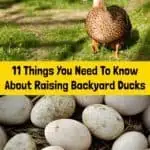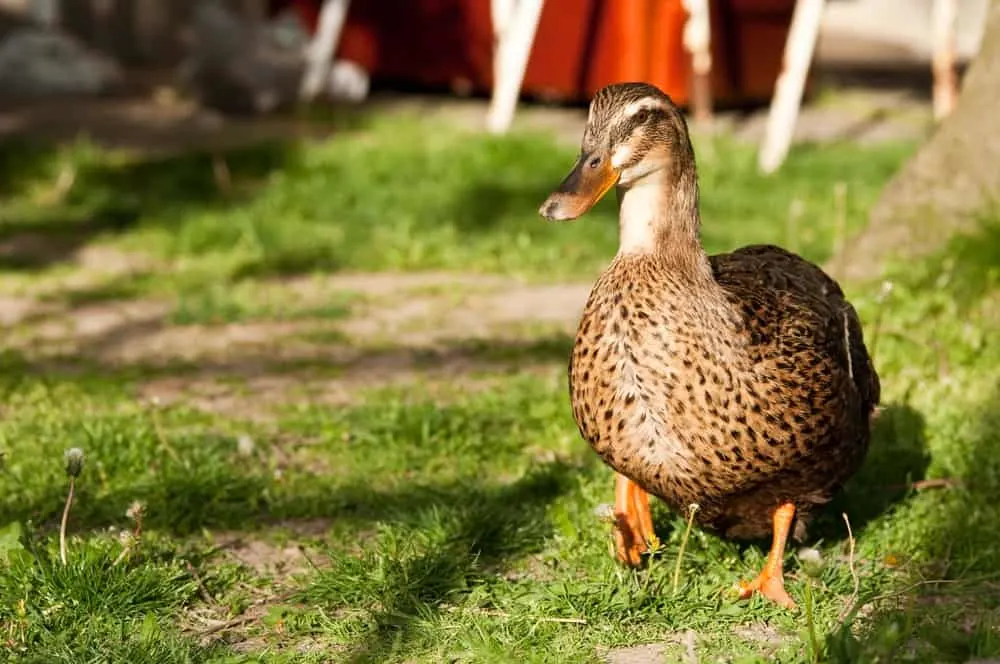
If the idea of raising backyard ducks makes your heart instantly go pitter-patter at the thought of little webbed feet waddling determinedly through the yard, then keep reading, this article is just for you!
Whether your intention is to keep them for meat, eggs or as helpers in the garden, know that ducks are a great addition to any backyard or urban farm.
Ducks are easy-going, tolerant to cold and resistant to diseases, allowing them to become the perfect forager on any homestead.
In addition to being productive layers, duck eggs are amazingly delicious and nutritious – more on that later.
How to get started raising backyard ducks
Once you have made the decision that you must have ducks, the easiest way to get started is to buy a few ducklings at your local feed store in springtime. You could also buy them online from a trusted hatchery, or from a nearby farm.
If ducks are what you want, they will somehow find you.
When you bring your new day-old baby ducklings home, you will discover that you need a few things for their happy survival:
- Brooder – to keep them safe all you need is a box filled with wood shavings, or a metal box with a wire mesh floor that allows droppings to pass through.
- Heat source – a heat lamp with a red bulb will substitute for their mother’s warmth at 90 F. Once ducks have developed feathers, they do not need the extra heat.
- Bedding material – pine shavings or straw are two good options, make sure to change it daily as it will get wet!
- Food – ducklings often receive unmedicated feed in the beginning (waterfowl starter crumbles), though it is perfectly suitable to nourish them with hard boiled eggs, cottage cheese, finely chopped lettuce or cooked peas. Mealworms can be added as a treat.
- Fresh water – the water needs to be deep enough for the ducks to clean their nostrils and beaks as they drink. Give them fresh water everyday.
Choosing a duck breed
Chances are that you are interested in raising ducks for either their meat or eggs, sometimes both. If you are on a small/urban homestead, a dual purpose breed should suit all your needs.
Welsh Harlequins are productive egg layers with the ability to lay 240 to 330 white shelled eggs a year!
They are active foragers, needing sufficient space to roam. In exchange, they provide you with delicious lean white meat at butchering time.
More dual-purpose duck breeds for backyard rearing:
- Aylesbury
- Orpington
- Blue Swedish
- Cayuga
- Silver Appleyard
Raising ducks for meat
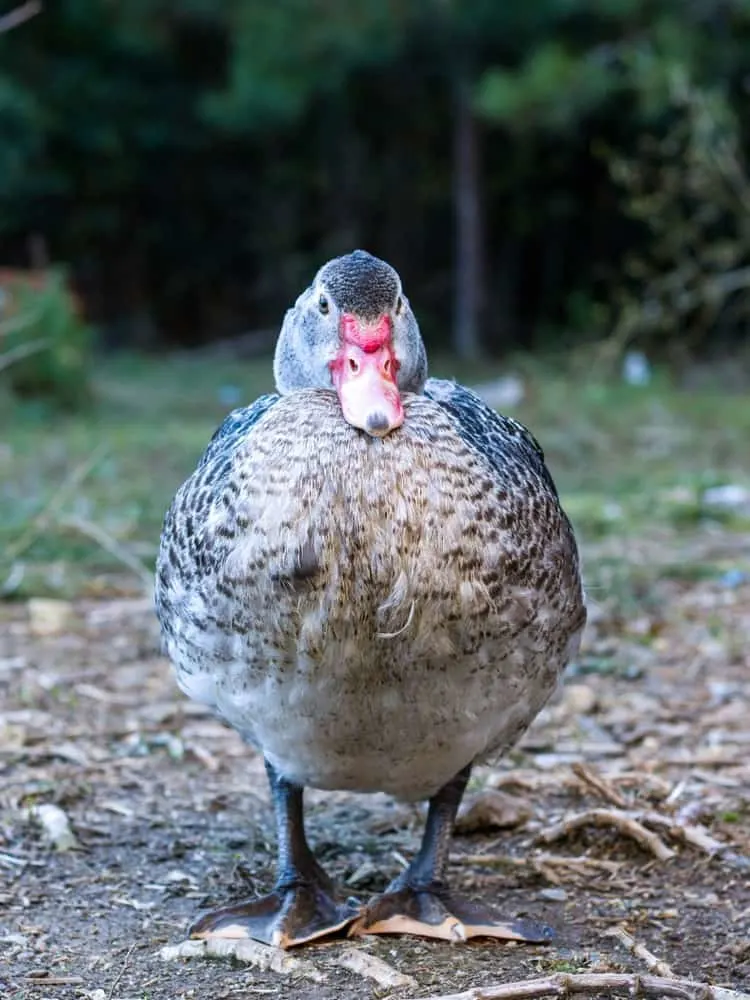
The most common duck meat you find at the butcher, or the supermarket, comes from the Pekin duck.
This breed often reaches six to seven pounds in less than 10 weeks – making them one of the most popular ducks due to their rapid rate of growth.
Flavorwise, the meat has a milder flavor than Muscovy ducks and is wonderful when roasted whole.
For the homesteader, Muscovies are another excellent choice as they make for great free-range poultry. Males tend to be on the larger side at ten to twelve pounds, females are lighter, weighing just five to six pounds. The meat is on the leaner side, as far as duck meat goes.
Raising ducks for eggs
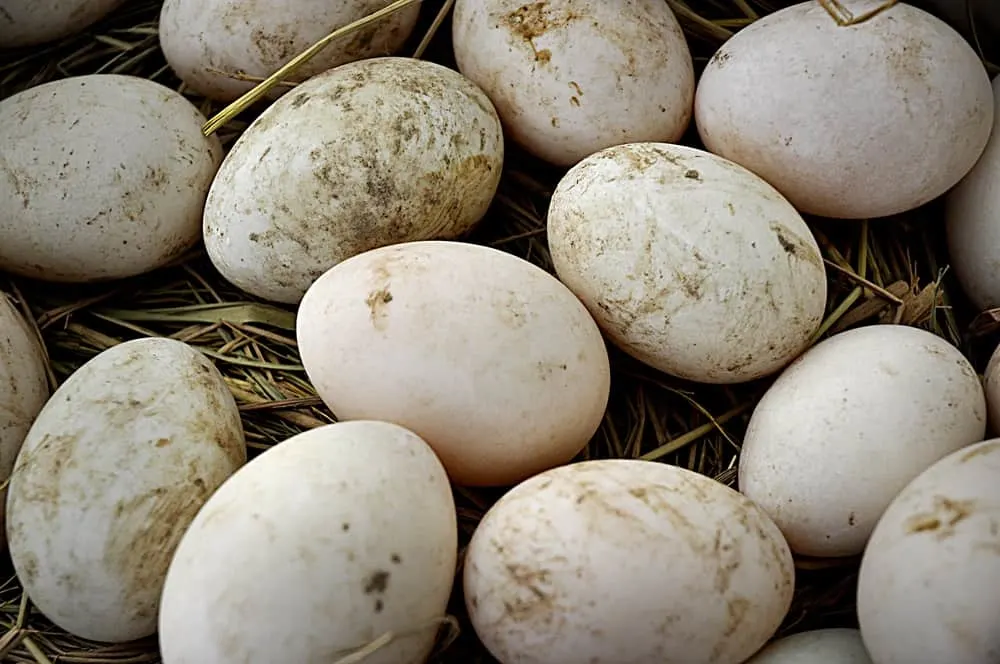
Two breeds of ducks are known for outlaying chickens in the course of a year – Runners and Campbells.
Runner ducks are non-flying ducks, who act as their name suggests: they choose to run, rather than waddle. It is known that a standard runner duck lays about four eggs per week, eight months of the year. They don’t make nests, so collecting eggs can become an egg hunt: leaving you to seek out shades of white, blue and green around the yard.
Khaki Campbells are a cross between a Runner and a Rouen, laying up to 300 eggs a year! Imagine you have at least five ducks… With so many eggs, you better love eating them.
Duck eggs have a thicker shell than chicken eggs, meaning that they can stay fresh for longer. We know them to be richer and creamier than a chicken egg, with higher amounts of Vitamin D, provided they are able to free-range.
Pastured duck eggs also contain abundant amounts of vitamins and minerals, including vitamins A, E, B6 and B12. They also help to boost our immune systems and metabolism, as they aid in strengthening our bones.
Are you a baker?
You are going to quickly develop a fondness for adding them to fluffy cakes and omlettes. The duck egg really is incredible!
Food for the ducks
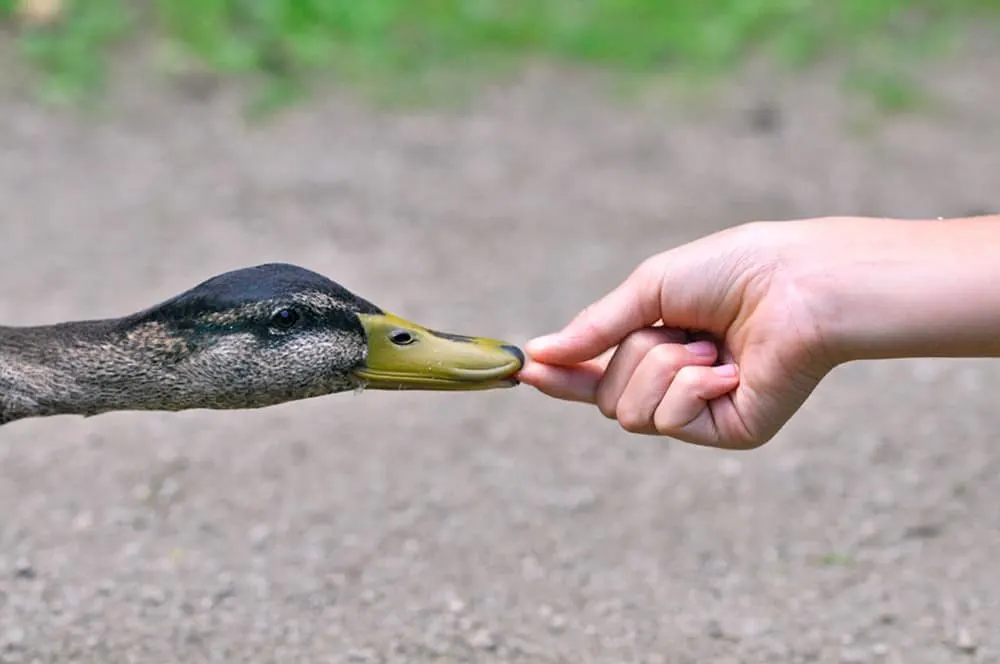
Ducks eat a lot and they are messy at best, though they are also super cute to watch as they dig tiny holes in the mud.
They cannot swallow food without water, so make sure they always have access to those two essential items at the same time.
Older ducks love to indulge in greens, so if your garden is producing, save a nibble for them. Kale, romaine, lettuce, they love it all, but spinach is not recommended as it can hinder calcium absorption.
Ducks are gentle on the lawn and won’t scratch it as chickens do, they are merely after the dandelions, chickweed and clover, as well as any insects that pass their way. They will gladly take any herbs you have to share with them: oregano, mint, dill or basil.
They will also appreciate cut-up, or mashed fruits and berries in season (keeping in mind that ducks have no teeth). If they develop a lust for tomatoes, you’ll need to keep them out of the garden!
Ducks in the garden
Ducks love to help out in the garden, eating the bugs that wish to eat the plants you want to eat.
Naturally, you may want to let your garden mature before letting the flock in, so they do not trample small seedlings, but once they are in, they will happily be eating slugs, flies and grasshoppers. They are a cost-effective way of insect control, and they will avoid most vegetables, unlike chickens, but strawberries may just be too hard to resist – just a word of caution. Lettuce may be irresistible too.
While they are in the garden, they will also be providing fresh fertilizer, providing a win-win situation. Give them plenty of space to roam, knowing that they will eat their favorites first (worms and slugs), then move onto most anything green.
Ducks vs. Chickens
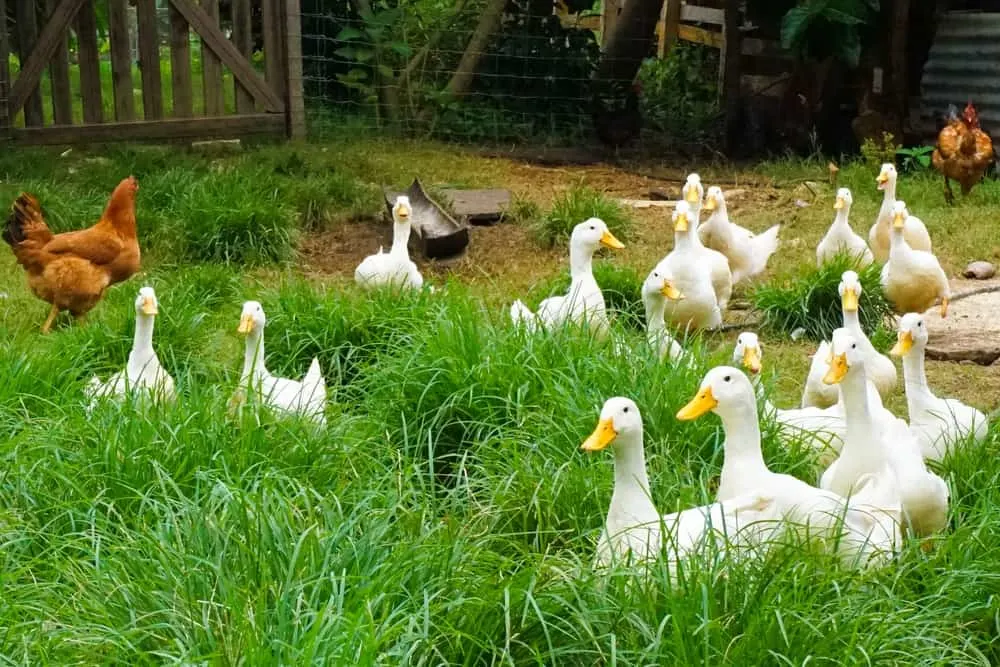
There are many enticing reasons to raise a flock of chickens – obviously, it will give you the chance to eat farm fresh eggs, it will help you reduce your food miles in the pursuit of a lower carbon footprint, chickens will provide free fertilizer, and they just so happen to come in a variety of breeds, it is almost hard to choose just one!
(Although you may wish to read this before deciding to raise backyard chickens!)
Bantams have proven themselves useful for urban homesteads, Orpingtons can be raised for both meat and eggs, while fancy chickens provide entertainment by adding a little flair to the flock with their unusual looks and fluffy plumage.
However, there are other factors to consider when getting into the hobby, or money-making, aspects of raising backyard poultry – and it may just be the duck that wins the race.
For the full breakdown of the chickens vs ducks debate, you’ll want to read this –
17 Reasons to Raise Ducks Instead of Chickens
First things first, consider the acceptable noise level for yourself and your neighbors. Roosters not only crow before dawn, they make themselves heard throughout the day. Male ducks, or drakes, hardly make a sound at all.
Female ducks will quack, or make a variety of other noises when excited or frightened, yet overall they tend to be a quieter crowd. Especially when you opt for a Muscovy.
Ducklings and water
It can be a sensitive matter, introducing your ducklings to water.
You are probably familiar with watching a momma duck and her many little babies swimming happily behind. Do not try this at home if you are raising your ducklings by hand.
Ducklings cannot swim on their own as they are starting out in life, so you will need to limit their access to water, other than drinking.
They do not produce waterproofing oil until they are 4 weeks of age. Until that essential month passes, you must be careful to give your ducklings space to dry out if they get too wet, otherwise they may die from the cold.
Mating
Male ducks, also called drakes, require multiple females in the flock as they have an extremely high sex drive.
A single drake will be satisfied with up to 12 hens. For this reason it is important to keep a balanced ratio in check.
And refrain from getting involved with your human emotions into their sometimes harsh mating behavior. Ducks have evolved to have complex sexual organs, you’ll experience this first hand when you prepare your ducks for dinner.
Raising ducks and chickens together
Ducks and chickens can get along just fine, provided that space is sufficient – keeping in mind that any animal in confinement can get upset.
The key to keeping both chickens and ducks happy in the same backyard, is to make sure they both have what they need. For starters, you’ll need two different drinking systems, whereas chickens take small sips, ducks need to submerge their entire head, then their body.
This in turn leads to splashing and mud.
Chickens don’t like mud and prefer to stay dry.
It all comes down to space and housing availability. Chickens will roost for the night, ducks prefer a place to sleep at ground level.
Then there are the dynamics of behavior. A drake and a rooster may, or may not, get along. If you have the land and the patience to make it work, go for it, mixed flocks can provide endless opportunities for joyful bird watching.
Healthy birds
Ducks do tend to be healthier than chickens and are not as susceptible to Marek’s disease or coccidiosis – two diseases that often plague chicken flocks.
They can also overwinter better in colder climates as they have an extra layer of fat and don’t mind walking around in a bit of snow. In summer, they keep cool by splashing in a pond or pool, or by simply laying in the shade.
Because they spend a good deal of time in and on the water, the possibility of attracting mites, fleas and ticks is very minimal. In essence, they are hardy birds, well suited to most climates.
Rather than dreaming about a flock of chickens, how about bringing a brace of ducks in your backyard?
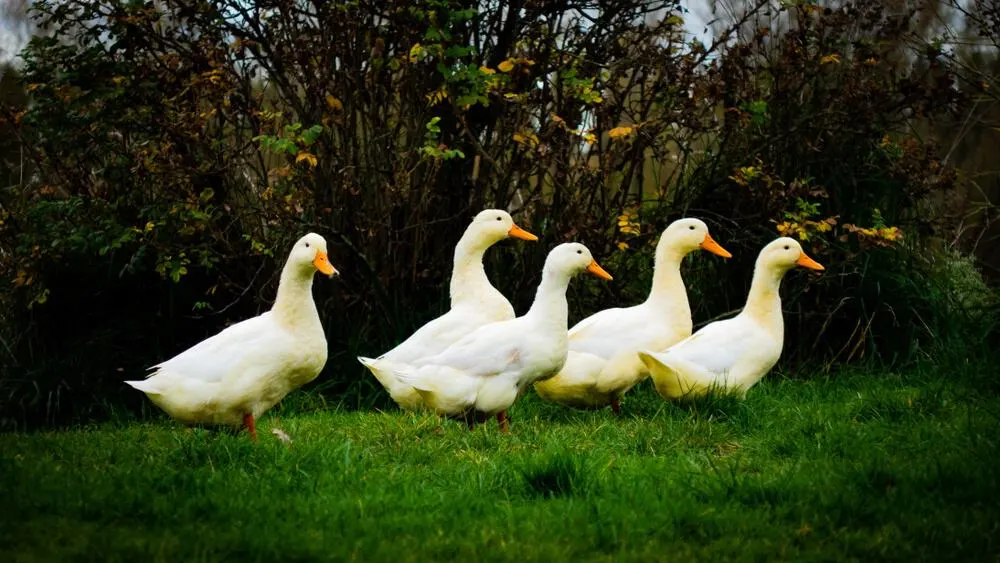
You’ll have plenty of opportunities to enjoy all their antics of mucking around in muddy puddles as they use their bills for digging and bug foraging.
Watch them long enough, and you’ll even get to see them blow bubbles in water!
They aren’t just having fun, though it may look that way, they are also cleaning out anything (feed, dirt, feathers, etc.) that could be lodged in their nostrils. They are just keeping clean, only to get muddy again; just like children.
If you don’t mind the mud and the water and the quacking, then you’ll love raising backyard ducks!
It is an experience that no homesteader should live without, at least for a year, or more.
Pin This To Save For Later
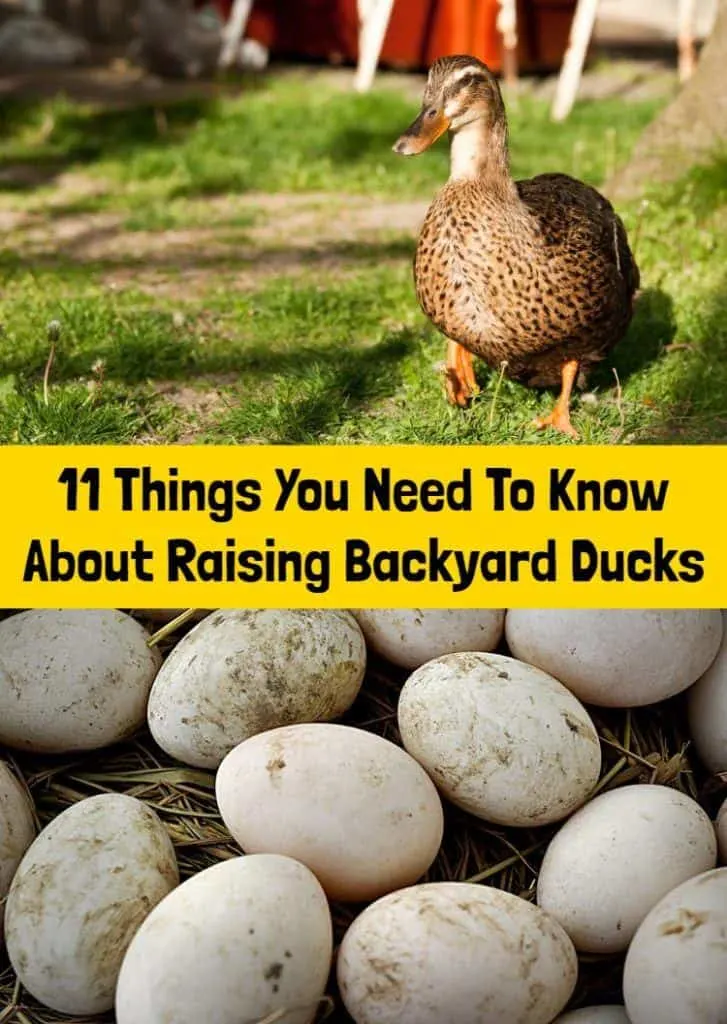
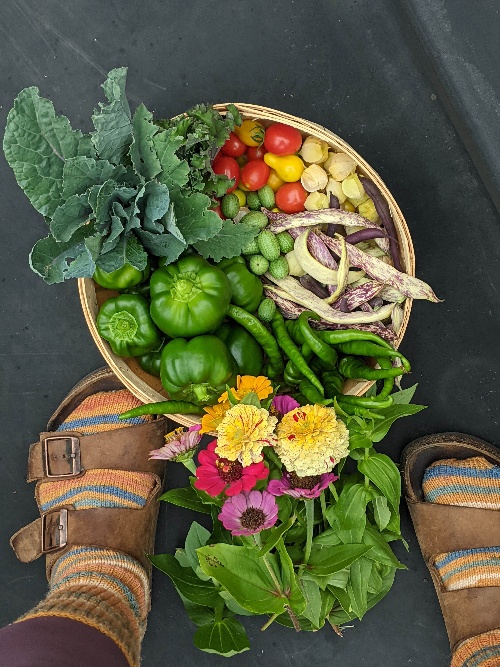
Get the famous Rural Sprout newsletter delivered to your inbox.
Including Sunday ramblings from our editor, Tracey, as well as “What’s Up Wednesday” our roundup of what’s in season and new article updates and alerts.


